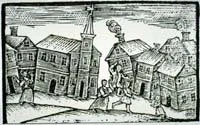But quakes do happen
An 18th-Century woodcut taken from a religious tract showing the effects in Boston of the Cape Ann Earthquake, on Nov. 18, 1755. The earthquake’s epicenter was just off Cape Ann and is believed to have been between 6.0 and 6.3 on the Richter scale, making it a powerful quake. It did major damage on Cape Ann and in Boston and remains the largest measured earthquake in Massachusetts so far.
“When Benjamin Franklin invented the lightning-rod {in 1749} the clergy, both in England and America, …. condemned it as an impious attempt to defeat the will of God. For, as all right-thinking people were aware, lightning is sent by God to punish impiety or some other grave sin—the virtuous are never struck by lightning. Therefore if God wants to strike any one, Benjamin Franklin [and his lightning-rod] ought not to defeat His design; indeed, to do so is helping criminals to escape. But God was equal to the occasion, if we are to believe the eminent Dr. Price, one of the leading divines of Boston. Lightning having been rendered ineffectual by the 'iron points invented by the sagacious Dr. Franklin,' Massachusetts was shaken by earthquakes, which Dr. Price perceived to be due to God's wrath at the 'iron points.' In a sermon on the subject he said, 'In Boston are more erected than elsewhere in New England, and Boston seems to be more dreadfully shaken. Oh! there is no getting out of the mighty hand of God.' Apparently, however, Providence gave up all hope of curing Boston of its wickedness, for, though lightning-rods became more and more common, earthquakes in Massachusetts have remained rare.”
— Bertrand Arthur William Russell, 3rd Earl Russell, (1872-1970) was a British mathematician, philosopher, logician and public intellectual.
#Cape Ann Earthquake
